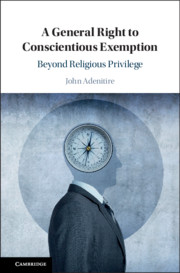Book contents
- A General Right to Conscientious Exemption
- A General Right to Conscientious Exemption
- Copyright page
- Contents
- Acknowledgements
- 1 Introduction
- 2 The General Right to Conscientious Exemption in US Law
- 3 The General Right to Conscientious Exemption in US Law: Beyond Religious Privilege?
- 4 The General Right to Conscientious Exemption in Canadian Law
- 5 The General Right to Conscientious Exemption in Canadian Law: Beyond Religious Privilege?
- 6 The General Right to Conscientious Exemption in UK Law
- 7 The General Right to Conscientious Exemption in UK Law: Beyond Religious Privilege?
- 8 The Liberal Model of Conscientious Exemptions
- 9 Balancing the General Right with Sexual Orientation Discrimination
- 10 Conclusion
- Index
8 - The Liberal Model of Conscientious Exemptions
Published online by Cambridge University Press: 27 July 2020
- A General Right to Conscientious Exemption
- A General Right to Conscientious Exemption
- Copyright page
- Contents
- Acknowledgements
- 1 Introduction
- 2 The General Right to Conscientious Exemption in US Law
- 3 The General Right to Conscientious Exemption in US Law: Beyond Religious Privilege?
- 4 The General Right to Conscientious Exemption in Canadian Law
- 5 The General Right to Conscientious Exemption in Canadian Law: Beyond Religious Privilege?
- 6 The General Right to Conscientious Exemption in UK Law
- 7 The General Right to Conscientious Exemption in UK Law: Beyond Religious Privilege?
- 8 The Liberal Model of Conscientious Exemptions
- 9 Balancing the General Right with Sexual Orientation Discrimination
- 10 Conclusion
- Index
Summary
This chapter complements part 4 of Chapter 1 by engaging with and refuting several objections which may be mounted to the arguments advanced there. Those objections are considered in this chapter while making the case for an attractive interpretative theory of how conscientious exemptions should be regulated in a liberal state. A liberal state is here understood to be one committed to individual freedom and state neutrality between different conceptions of the good life. This chapter calls the interpretative theory the Liberal Model of Conscientious Exemptions. This theory has the following four defining propositions:A. The liberal state should grant a general right to conscientious exemption.B. The liberal state should refrain from passing moral judgement on the content of the beliefs which give rise to a claim for conscientious exemption.C. The liberal state should neither privilege nor disadvantage religious beliefs over non-religious ones when considering whether to grant a conscientious exemption.D. The liberal state should grant conscientious exemptions to claimants who sincerely hold a conscientious objection which would not disproportionately impact the rights of others or the public interest.The chapter defends each of the propositions in turn.
Keywords
- Type
- Chapter
- Information
- A General Right to Conscientious ExemptionBeyond Religious Privilege, pp. 226 - 278Publisher: Cambridge University PressPrint publication year: 2020



